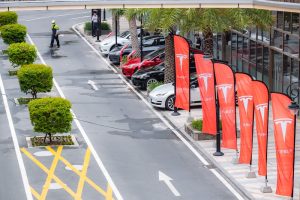In a recent ruling, a judge sided with Tesla in a lawsuit claiming the automaker monopolized parts and services, forcing customers to endure high prices and long wait times. A Model S owner sued Tesla earlier this year, alleging that the company's actions caused delays and increased costs for repairs and maintenance. The judge, Trina Thompson, stated that the class-action proposal did not sufficiently demonstrate that the alleged issues were unknown upon purchase or that the costs of keeping the vehicles on the road were unpredictable.
The lawsuit combined claims from five separate cases where Tesla owners paid for repairs and parts services since March 2019. The plaintiffs argued that Tesla's restrictions on repair options, including limiting repairs to Tesla service centers and mandating the use of Tesla parts, led to higher costs and extended wait times. However, the judge concluded that the customers could not prove coercion by Tesla into using its repairs and parts merely by purchasing the electric vehicles.
While the judge ruled in favor of Tesla, she left the door open for the customers to amend their complaint. The original complaint highlighted that Tesla owners couldn't have their vehicles fixed at independent auto shops or use third-party or OEM parts for repairs.
Tesla's service model has been a subject of criticism, with owners required to use the automaker's own service centers and parts, risking voiding warranties if they opt for third-party repairs or parts. The ruling, while a legal victory for Tesla, adds to the ongoing debate about repair options, competition, and costs within the automotive industry.
It's worth noting that the judge suggested the customers could amend their complaint, leaving room for potential future legal actions. As the automotive landscape evolves, especially concerning electric vehicles, discussions around repair access, parts availability, and pricing are likely to continue, impacting both automakers and consumers.






















